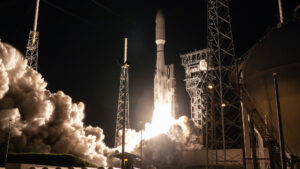Space insurers hoping to break even after recent losses
By Jeff Foust

WASHINGTON — After two consecutive years of losses, the space insurance industry is hoping to break even this year while seeking continued increases in premiums.
Speaking at Euroconsult’s World Satellite Business Week Virtual Edition Nov. 10, Dominique Rora, head of space underwriting at AXA XL, said he expected insurers to break even after suffering several hundred million dollars in losses in 2018 and 2019.
“We expect that premiums will be around break-even. The premium revenue is still low, but it should be around the level of claims if we don’t have further claims before the end of the year,” he said.
Space insurers suffered losses in the last two years primarily because of a decline in revenues rather than an increase in claims. Rora noted that the losses in 2018 and 2019 were “in family” with what the industry had seen over the last two decades, although losses in 2019 were among the highest during that period. The problem, he said, was that premiums had dropped by half since a peak of about $1 billion in 2012.
Premiums dropped because of sharply declining rates for both launch and in-orbit coverage. Those rates have increased since last year, Rora said, but have only returned to levels seen in 2012 to 2014, and far below historic peaks in the early 2000s.
Despite that rebound in rates, Rora said the insurance market had not yet fully recovered. “Break-even is good, but it is far from being sufficient,” he said. “What we need is for the markets to return to a level of premium that is sufficient to ensure a sustainable level of profit” that allows insurers to absorb losses.
A complicating factor is the broader problems with the overall insurance industry caused by the pandemic. Insurers, he said, “focused a lot more this year on reducing volatility and ensuring profitability. That is the number one priority of every management team.”
Some launch companies said that volatility, and lack of market capacity, has affected them. “We have seen commercial missions that have delayed later, out of this year, because of this temporary constriction of the capital markets. In some cases, the insurance capacity that is available is insufficient,” said Tory Bruno, president and chief executive of United Launch Alliance, during a separate launch panel at the conference Nov. 9.
Bruno said he was aware of a couple customers that have delayed mission until they get insurance. “We’re already seeing the capital markets recover, so I would expect early next year, middle of next year at the latest, we’ll see a return to normalcy,” he said.
That does not appear to be a universal issue. “We definitely have seen some customers delayed. I was unaware of any of those delays being insurance or capital related,” said Gwynne Shotwell, president and chief operating officer of SpaceX, on the same panel.
Rora advised space industry customers not to wait to buy insurance, thinking that prices will go down. “One trend that we see is that we have a number of clients who are postponing to buy insurance in the hope that the rates will come down soon,” he said. “It’s very hazardous to try to time the market, because history has shown that rates can go up much quicker than they can down.”
The space industry is also adjusting to new technologies. On-orbit servicing, he noted, has the potential of reducing insurance premiums by giving satellite owners the ability to repair satellites rather than file a claim for a partial or total loss. “We will have to factor in the new technologies, the new client landscape, the new types of risks,” he said. “We will have to reinvent ourselves.”
November 11, 2020 at 12:13AM
via SpaceNews read more...

Post a Comment